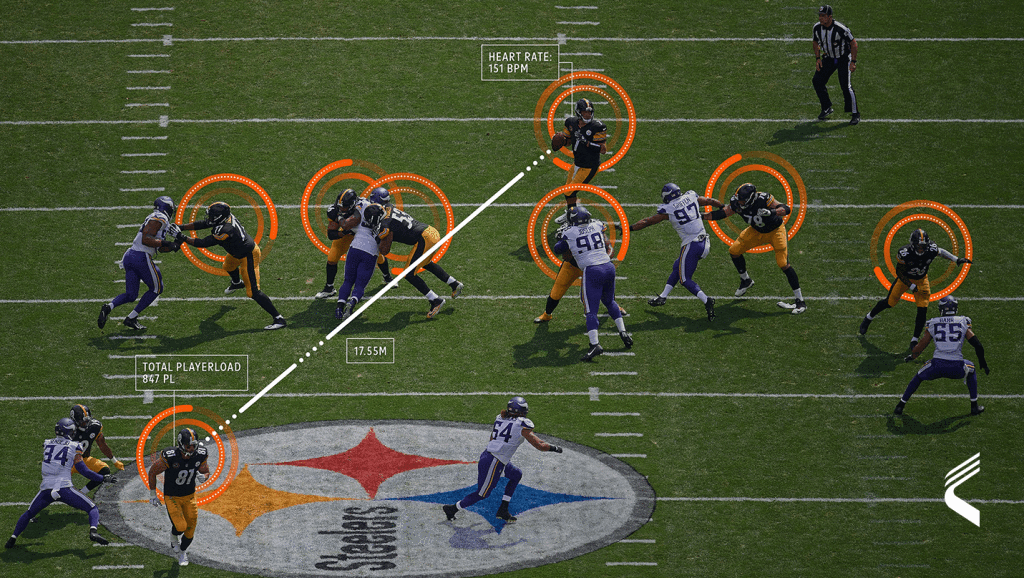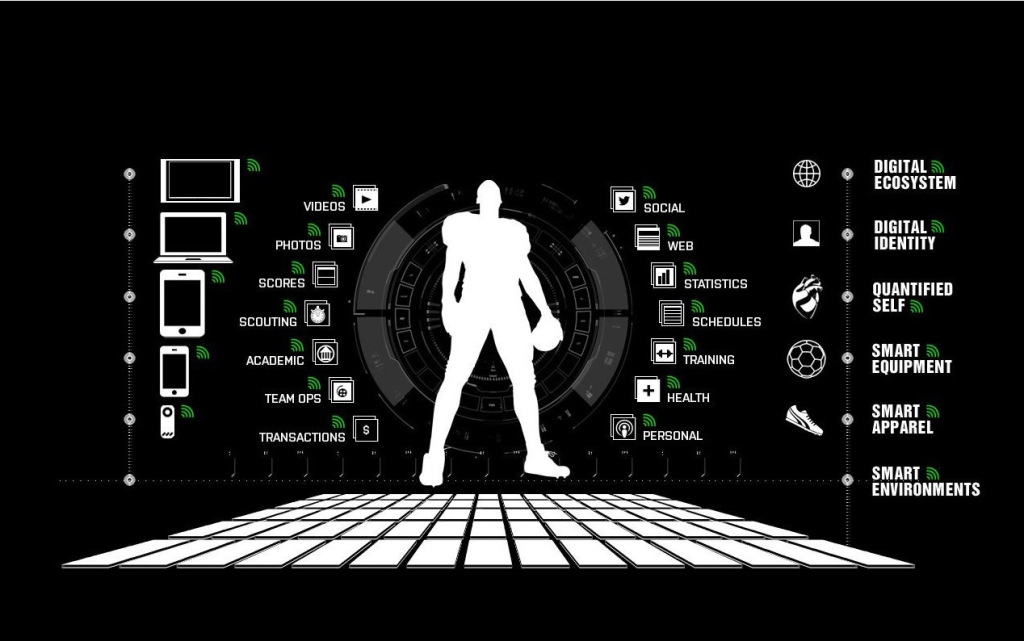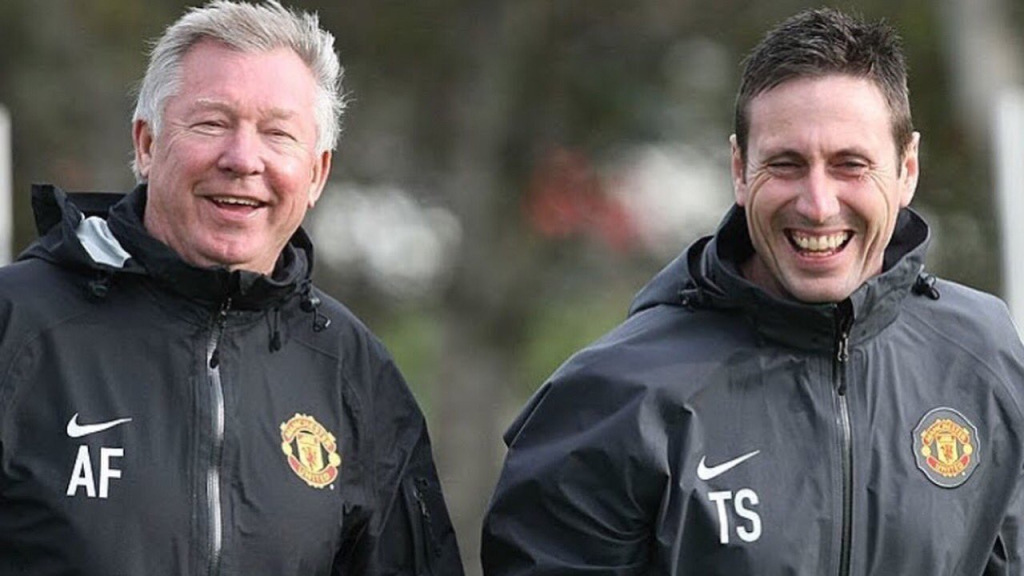
Image courtesy of Catapult Sports
PART 1: WHAT IS SPORTS SCIENCE? #GOLDENPOINT9 – MICHAEL MACRI
There is a common belief within the industry of high-performance sport that sports science is relatively new. Well, what if I told you that the origins of sports science can be traced back to ancient Greece where noted physicians Herodicus (5th century BC), Hippocrates (460-370 BC) and Galen (129-210 AD) investigated how exercise could make athletes fitter, faster, stronger and most importantly, healthier!
Bit of a stretch? Okay, how about when American physician Austin Flint studied the physiological responses to exercise when working with endurance athlete Edward Payson Weston in 1871. The fact of the matter is that sports science is not a new phenomenon. However, whilst sports science has been around for thousands of years, technological advances throughout the last 30 years have accelerated its growth within elite sport. As a result, sports science has become relatively new within sports that have been doing things in a particular way for a very long time such as (American) Football, Basketball, and Baseball.
So if sports science has been around for a very long time, why are there so many definitions as to what it actually is? Why can we define Strength & Conditioning and Sports Medicine but we struggle to agree on the definition of sports science? Some will say that the beauty of sports science is that it can be interpreted in many ways. I wholeheartedly disagree with that sentiment and I’ll explain why.
The high-performance sports industry has always been a perception-based industry. How do we definitively know that if a team succeeds whether that success was due to the athletes, coaches, performance staff, or a combination of all three? Strength & Conditioning Coach, Al Vermeil once said that “an athlete can make up for the sins of a poor program.” If true, then why is it that when a team wins a championship, we instantly think that the performance staff involved with that team must be world-class practitioners? Our perception that winning teams must have the best athletes, coaches, performance staff, administrators, etc. is not always the case.
In saying that sports science can be interpreted in many ways, we are creating a perception of what we believe it to be rather than identifying what it actually is. If we can’t agree on what sports science is, how can we expect Athletic Directors, General Managers, and Head Coaches to understand? These are the people that need to be educated the most because they’re the decision-makers within any given organization.
Unfortunately, sports science has become a vehicle for those to drive their agenda for personal gain rather than to positively push the industry forward. It almost feels like every week a new sports science guru appears endorsing the next best thing since sliced bread! The crazy thing is that we all fall for it due to our overwhelming curiosity. We collectively take this “new” tool as Gospel because we are desperately trying to find that 1% edge over our competitors. In the end, the only people that benefit from the experience are the gurus who are literally cashing in on our efforts to be further educated on something that won’t make a positive impact towards winning.
For example, there are companies and programs that claim to have the ability to predict injuries before they occur. As we know, this is not possible. Don’t get me wrong, there are a lot of great practitioners out there doing their best to make a positive impact. The sad reality is that for every person trying to push the industry forward, there are 10 people criticizing that person for the attempt.
In recent times social media has been abuzz with people doing their best to push the conversation forward regarding their belief as to what sports science is so here’s my two cents worth. In my opinion, sports science is the collection, analysis, interpretation, and visualization of performance data within the context of sport. The focus is to help maximize individual or team performance over time and to mitigate the risk of injury.
Sports science isn’t limited to one area of the high-performance ecosystem, rather it can (and should) be present within the areas of Strength & Conditioning, Sports Medicine, Nutrition, Human Movement, Sports Psychology, etc. A combination of objective and subjective data helps piece the high-performance puzzle together. This can be achieved through various means however at the end of the day, all roads lead to Rome. Interpretation of the data within the context of sport is key! Data without context is just numbers but more than that, knowing what an athlete did on any given day isn’t enough. There are 3 things we should all want to know:
- Are we getting better?
- Are we staying healthy?
- Is what we are doing during the week helping us to win games on the weekend?
Once we know the answers to these questions, it’s our job to educate the most important stakeholders within the organization: the coaches. Sports science is not productive if actionable change isn’t achieved (or if the data/research isn’t applicable). And how does this occur? If the Head Coach allows it. Whether you like it or not, those that work in elite sport work in a customer service-based industry. We as practitioners are the server and the athletes and coaches are our customers. It is our role to support and guide them in the right direction! This is done through the education of our athletes and coaches.

More than that, we must learn to speak their language so they can understand the message that we’re trying to convey. We must also learn how to gauge the values, beliefs, and ideals of our audience especially that of the coaches we are working with! Time and again I’ve seen examples of where a practitioner will try to explain to a Head Coach the nuisances of GPS data or load management using sports science jargon. More often than not they are greeted with a few choice words and are completely dismissed. This is because the Head Coach doesn’t care about the science. They are more concerned about the X’s and O’s of the sport they have been hired to coach. It’s our role to help them understand and appreciate that the science can help them, and their team be successful.
The human element of sports science is the most important aspect of the industry. If you spend hours and hours analyzing data but the coach doesn’t give your analysis the time of day, then you’ve wasted your time as a practitioner and failed in the responsibilities of your role. Stop thinking sports science only involves technology and data. Just because your spreadsheet says that an athlete is “red-flagging” doesn’t mean they truly are! Besides, how would you even know what makes that athlete tick if you’ve never taken the time to get off your laptop and genuinely get to know them?
Taking the time to develop relationships with your athletes and coaches builds trust and respect. Once this is achieved you can then start effecting actionable change. Why? Because athletes and coaches that trust and respect you, are more inclined to listen to what you have to say! This is why sports science isn’t a quick fix. You have to play the long game but if you do the results can be very powerful!

As I write this article I’m very well aware that I will have my detractors and that’s okay. We are all entitled to our own opinion. Everyone who works in this industry is extremely passionate about what they do in one way or another. We all want what’s best for our team, our athletes, our fellow colleagues, and ourselves. It’s possible that I’m preaching to the choir and maybe the people that really need to hear all this are the Athletic Directors, General Managers, and sports coaches!
Regardless of what position you hold, I have no doubt that everyone wants to see forward progress in this industry; it’s a win-win situation for all, especially those who strive to see the industry financially reward us in ways that we all feel like we should be. However, in order for that to happen, we need to get our own backyard in order. In this instance, sports science needs to be properly defined and universally agreed upon what it actually is. Only then can we educate the decision-making stakeholders within sports organizations on what sports science truly is and eradicate the false understanding and stigma towards it.
The only way this can happen is if we work in unison and not against each other. Arguments are best saved for the schoolyard. It’s time we put on our big boy/girl pants and have constructive conversations about the current sports science narrative so that we can push the industry forward. So as I sign off, I want to leave you with a quote from Simon Sinek:
“Words may inspire but only action creates change.”
Now is the time. Only positive things can come of it!
Authored By:
Michael Macri is Head of Sports Science for ApolloV2
Originally published on the Oval Office site.